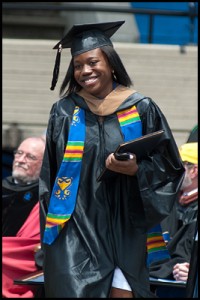
Mock Interviews at Bottom Line's 2009 Go Far Forum
In two weeks, Bottom Line will host the annual Go Far Forum, a student event that features a career fair, mock interviews, presentations from industry leaders, and (new this year) a networking reception. All the planning for this event has got us thinking, Why is it important to help college students with their professional development and careers? Below are four things Bottom Line focuses on helping students in our College Success Program with to promote their success after graduation.
1. Interviewing
With few exceptions, most undergraduates will never be assigned homework that requires them to undergo a professional interview—the kind where you have to answer abstract questions that indicate your work ethic and team-working abilities, wear a modest pencil skirt or tie, and generally present yourself as a polished and qualified individual. This just isn’t part of the curriculum for an engineering program or a humanities degree.
While some colleges require students to take a speech class where they learn how to speak confidently and make eye contact, promoting oneself to a potential employer can be remarkably different than giving a presentation in class. You need to be prepared to answer difficult questions, such as why a company should hire you over someone else, why you left your last job, and how your studies have prepared you for the industry. Unless they seek the advice of a mentor or their school’s career center, a college student will probably not be asked one of those questions until they land in a job interview. Furthermore, many jobs that students interview for prior to completing their degree don’t require the same preparation and skill set that an interview for a post-graduate job does.
2. Networking
College is a great place for learning how to mingle in social settings, but not necessarily professional ones. It’s possible to spend an entire college career traveling between class, a lax on-campus job, your dorm or home, and the occasional gathering with friends without experiencing a business social setting. This is another place—other than the job interview—where college students could develop the skills of tactful self-promotion and professional confidence. When a student leaves college, being able to network would greatly benefit their job search and general success in the business world.
3. Dressing Professionally
When you’re a teenager, you can get away with wearing an ill-considered outfit, even if you’re filing or answering phones in an office. But when you’re an adult with a college degree who is applying for jobs that require you to represent someone’s business, an employer will be looking for you to look the part. Most college students spend their days in jeans (if not their pajamas) and don’t necessarily have a reason to own an iron or lint remover. In fact, these details probably escape you when what you’re wearing is irrelevant to completing a 12-page paper or passing an exam. For this reason, exposure to a business setting can be important for college students to learn how to carry themselves professionally.
4. Exploring (Realistic) Post-Graduation Options
While professors may impart how your schoolwork will help you in the working world, it’s not always clear how spending twenty-something hours a week in a classroom translates to you being qualified to work in the field. For English or History majors, it may not even be clear what kinds of jobs you should pursue.
Exposing college students to their field through meaningful internships or introducing them to successful professionals can show them their options, give them a feel for what they may like to pursue, and allow them to make informed decisions when they graduate rather than searching blindly for a career path. Many college graduates would probably say it would have been nice to know which industries could use their talents, what the salary offerings are like, and how much more schooling they would need to land their dream job, prior to entering the working world. Information about what employers are looking for allows graduating seniors to set appropriate goals, whether that means attending graduate school to become a psychologist or climbing the career ladder from an editorial assistant to an editor in the publishing world.
While Bottom Line doesn’t expect to impart all of this wisdom to our college students in a 3-hour event, we hope that the 2011 Go Far Forum offers a great jumpstart for them to prepare for their careers. In the coming months, we will help our students write resumes and cover letters, apply for summer jobs and internships, and get one step closer to becoming confident professionals and pursuing fulfilling careers.
Jen Bees
Success Coordinator
Bottom Line, career fair, career planning, College Success, Go Far Forum, graduation, interships, job interview, job search, networking, professional development, recent graduates



